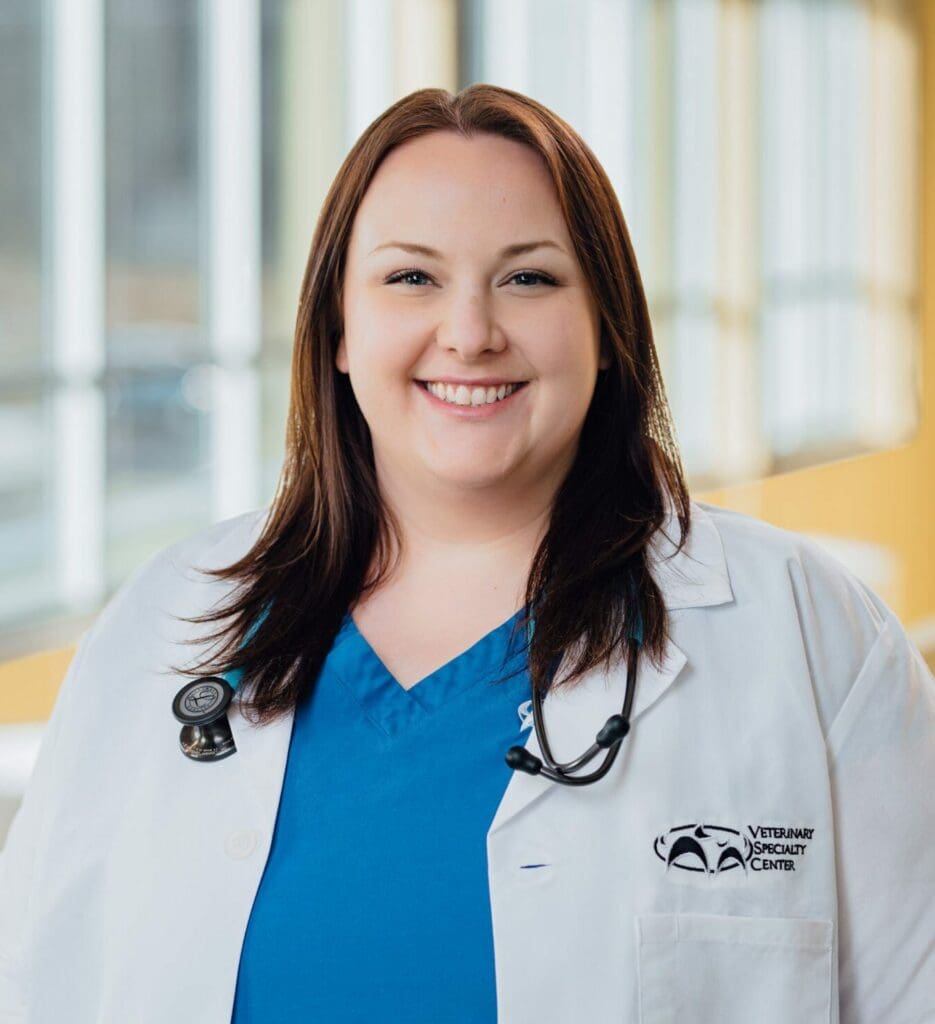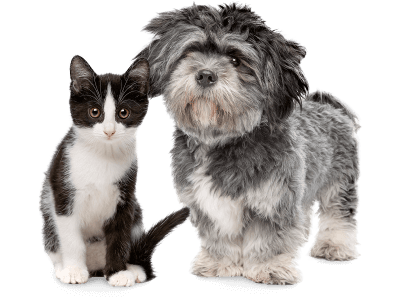Lynn Little, DVM, Residency-Trained in Internal Medicine
Internal Medicine
DVM
The Ohio State College of Veterinary Medicine
Internship
Tufts University College of Veterinary Medicine
Internship
Residency
Purdue University College of Veterinary Medicine
“If you do the work, you can really puzzle through some things that don’t always make sense, and that can be really rewarding when you find the right answer.”
Dr. Lynn Little found a passion for medicine at a young age, which is not surprising since she came from a long line of medical professionals. What set her apart was her love for animals coupled with a passion to help them. She is proudly the first veterinarian in her family and Dr. Little says her desire to be a vet was so strong because “animals do not always have a voice, so it is more of a puzzle to figure out.”
She also values how important animals are to their families and that she not only gets to help pets but the people who love them, too.
Veterinary Education for Dr. Lynn Little
Dr. Little’s journey began in Columbus, Ohio, where she obtained her Doctor of Veterinary Medicine degree from the Ohio State University. There, she was able to benefit from the diversity of experience and many hands-on learning opportunities that their program provided.
After graduating, Dr. Little went on to work in a private practice where she experienced the veterinary world as a general practitioner and referring veterinarian. Now that she is a specialist and has patients being referred to her, she feels that her past experience has given her greater empathy and understanding of the process, allowing her to tackle the communication hurdles that can occur with owners and referring veterinarians along the way.
The Journey Towards Internal Medicine for Dr. Lynn Little
While in general practice, Dr. Little had a dual appointment as an Emergency Veterinarian where she discovered that emergency and critical care medicine was where her passion really lay. In particular, she realized she enjoys helping pet parents navigate the sometimes-overwhelming amount of information and many treatment decisions that come with being the caregiver for a sick pet.
Dr. Little then went on to do a specialty internship in Emergency and Critical Care at Tufts University. While there, she learned another impactful lesson; that it is not over till it is over! Although this Emergency internship was a tough and exhausting stage in her career, it also taught Dr. Little valuable lessons that have shaped her as a veterinarian.
During the internship, Dr. Little was inspired by the case of a 7-year-old Australian Shepherd who presented with severe ivermectin (dewormer) toxicity after eating a horse-sized dose of this normally safe medication. The dog was completely unconscious and unable to breathe on her own. Even a neurological exam could not elicit basic responses. Despite a seemingly grave prognosis, the team of veterinarians at Tufts University were committed to doing their absolute best to help her. She was placed on a ventilator in ICU to help her breathe and given round the clock supportive care while her body cleared the toxin. Amazingly, after two weeks she become more alert, and no longer needed the ventilator to breathe. It took two more weeks for her to be strong enough to go home, but ultimately, despite many hurdles, she made a full recovery.
What Dr. Little learned from this case is that remarkable things are possible in veterinary medicine when advanced training and resources are available. It also requires that pet parents and their veterinarian have an open and honest discussion about the illness their pet is facing, balancing hope for recovery with long-term prognosis and quality of life concerns. Good communication ensures that pet parents are able to make informed decisions that most benefit their pet. The value of this shared decision making was evident throughout her Tuft’s internship and motivated her to become the best communicator possible. Pet parents can be comfortable that Dr. Little will always work hard to ensure they know what hurdles they are facing while not losing hope that with the right treatment plan they can get their pet feeling better again.
Over the course of her ER internship, Dr. Little learned that the cases that she loved the most were actually internal medicine cases, so she shifted her focus to Internal Medicine with a move to the Western College of Veterinary Medicine at Saskatchewan. Because it was the only specialty hospital in the entire province, she was able to see some challenging cases including another case that helped shape her career.
This particular case involved a little tortoiseshell cat named Princess, who was originally referred for what appeared to be acute kidney failure. However, upon further investigation, Dr. Little determined that she had a disease called primary hyperparathyroidism (also referred to as overactive parathyroid), which causes high blood calcium levels that can injure the kidneys. While this disease is relatively common in dogs, it’s very rare to see in cats. Luckily for Princess, this diagnosis meant that she could have surgery to remove the overactive parathyroid gland and her kidneys were able to heal after her blood calcium levels returned to normal. Dr. Little considers this experience to be one of her best patient-client relationships. She not only appreciated how rare the case was, but also how willing Princess’ owner was to go the extra mile and how positive the outcome was, saying that “those are the golden cases that you remember and you love for life.”
Next, Dr. Little continued on to her residency program at Purdue University. While there, she handled a high case load of seriously ill hospitalized patients as well as more typical outpatient cases. She also received training in interventional urology procedures and dialysis. Along the way, Dr. Little met many more wonderful patients who pushed her to keep asking questions and that the right treatment may be just one more literature search away.
Dr. Little feels that the many challenging cases she experienced during her internships and residency not only sharpened her skills as a doctor, but also taught her the value of hope, and honest, yet empathetic, communication. Her breadth of experience and dedication to keeping pet parents informed allow her provide support and high-quality care to their pet.
Life for Dr. Lynn Little as a Practicing Veterinarian
After completing her residency, Dr. Little joined the Internal Medicine team at Veterinary Specialty Center. She chose VSC because of the collaborative environment both within the Internal Medicine Department and with the other specialties. Dr. Little believes that the ability to collaborate with other specialists is essential to providing optimal care and achieving what initially seemed impossible. Having so many specialists in the same building allows veterinarians like Dr. Little to tailor their treatments to each patient, as “each individual situation is different, so there’s a lot of nuance that goes into deciding what to do next and what is right for that particular situation.”
Dr. Little’s professional interests include gastroenterology, immune-mediated disease, endocrinology, and feline medicine.
Studies Conducted by Dr. Lynn Little
Dr. Little participated in a study of female dogs with possible urinary tract infection (UTI) that evaluated the accuracy of bacterial cultures obtained by different urine collection methods. The human standard for taking a urine sample is a clean midstream free catch. However, in veterinary medicine it involves a mildly invasive procedure called cystocentesis. This procedure is used to obtain a sample of urine directly from the bladder using a needle, as urine that is collected by free catch has passed through the urethra and may be contaminated with bacteria, thereby making interpretation of the culture results difficult.
In some cases, cystocentesis is a poor or unviable choice. For example, a dog with bladder cancer would be a poor candidate for cystocentesis because it may jeopardize an already compromised bladder or inadvertently spread cancer cells in the surrounding tissues.. Dr. Little’s study looked at whether the addition of a cleansing step, similar that used in women, would improve the accuracy of voided urine collection in dogs. The study supports that clean midstream samples are the preferred choice when cystocentesis is not a viable option.
Life Outside of Work for Dr. Lynn Little
When she is not helping out our furry friends, Dr. Little enjoys traveling, being outdoors, cycling, and taking her dog for hikes. And when she is not feeling as outdoorsy, she spends her inside time enjoying movies, playing cards and board games, reading, or trying out various craft projects. When asked if she is a dog or a cat person, Dr. Little says she “truly doesn’t feel balanced in her life without both.”
When it comes to veterinary medicine, she does have a special spot in her heart for feline patients. She feels they are often misunderstood, and really enjoys working to modify their environment and handling to make the experience as comfortable as possible.
